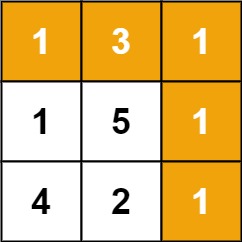LeetCode-in-All
64. Minimum Path Sum
Medium
Given a m x n grid filled with non-negative numbers, find a path from top left to bottom right, which minimizes the sum of all numbers along its path.
Note: You can only move either down or right at any point in time.
Example 1:

Input: grid = [[1,3,1],[1,5,1],[4,2,1]]
Output: 7
Explanation: Because the path 1 → 3 → 1 → 1 → 1 minimizes the sum.
Example 2:
Input: grid = [[1,2,3],[4,5,6]]
Output: 12
Constraints:
m == grid.lengthn == grid[i].length1 <= m, n <= 2000 <= grid[i][j] <= 100
To solve this task using Python with a Solution class, you can follow these steps:
- Define a class named
Solution. - Inside the class, define a method named
minPathSumthat takesgridas an input parameter. - Implement the logic to calculate the minimum path sum using dynamic programming.
- Create a 2D grid of size
m x nto store the minimum path sum to each cell. - Initialize the first row and first column of the grid with cumulative sums.
- Iterate through the grid starting from the second row and second column.
- For each cell, update its value to the minimum of the values to its left and above plus the current cell’s value.
- Return the value in the bottom-right cell of the grid, which represents the minimum path sum.
Here’s the implementation:
class Solution:
def minPathSum(self, grid: List[List[int]]) -> int:
# Get the dimensions of the grid
m, n = len(grid), len(grid[0])
# Create a grid to store the minimum path sum to each cell
dp = \[\[0] * n for _ in range(m)]
# Initialize the first row and first column
dp[0][0] = grid[0][0]
for i in range(1, m):
dp[i][0] = dp[i-1][0] + grid[i][0]
for j in range(1, n):
dp[0][j] = dp[0][j-1] + grid[0][j]
# Calculate the minimum path sum for each cell
for i in range(1, m):
for j in range(1, n):
dp[i][j] = min(dp[i-1][j], dp[i][j-1]) + grid[i][j]
# Return the minimum path sum in the bottom-right cell
return dp[m-1][n-1]
# Example usage:
solution = Solution()
print(solution.minPathSum([[1,3,1],[1,5,1],[4,2,1]])) # Output: 7
print(solution.minPathSum([[1,2,3],[4,5,6]])) # Output: 12
This implementation uses dynamic programming to efficiently calculate the minimum path sum. It iterates through the grid only once, so the time complexity is O(m * n), where m is the number of rows and n is the number of columns.
Solution
from typing import List
class Solution:
def minPathSum(self, grid: List[List[int]]) -> int:
n = len(grid)
m = len(grid[0])
dp = [[0]*m for _ in range(n)]
dp[0][0] = grid[0][0]
for j in range(1,m):
dp[0][j] = grid[0][j] + dp[0][j-1]
for i in range(1,n):
dp[i][0] = grid[i][0] + dp[i-1][0]
for i in range(1, n):
for j in range(1,m):
dp[i][j] = min(grid[i][j] + dp[i-1][j], grid[i][j] + dp[i][j-1])
return dp[n-1][m-1]

